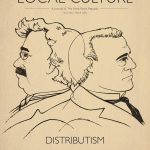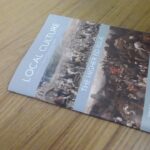Many of the essays being published right now respond to the coronavirus, and while I’ll link to a few of these below, they all suffer from our fundamental ignorance of the scale and shape of this problem. Not only do we lack the information needed to make wise prudential decisions about what policies are appropriate, but more fundamentally the systems affected are too big and entail too much uncertainty for anyone to have the epistemic footing to make such decisions. We can probably agree that we shouldn’t weld people into their apartments and we shouldn’t party like it’s 1999, but ruling out those extremes doesn’t considerably narrow the range of options.
Many of the lessons we should learn from this difficult time seem to parallel the lessons we failed to learn from the ’08 crash—we can build economies and systems that are too big not to fail. Their enormity makes them irreparably fragile. The one thing we should do is the one thing we almost certainly won’t do—find ways to unwind our too-centralized economy and make it more local and hence resilient. Nevertheless, outside the corporate boardrooms and far from the halls of congress, people of goodwill continue to serve their neighbors and do what they can to sustain the health of their local places. FPR will be publishing several essays on how localists might respond to this global pandemic, but we’ll also continue to publish essays and book reviews that aren’t directly related to the virus; a broad conversation about place, limits, and liberty is more important now than ever.
“The Coronavirus Pandemic and Future Food Security.” Patrick Holden criticizes the “highly centralised commodity-based supermarket sourcing system” that we depend on for our food. As he concludes, “At a time when there is an unparalleled threat to the future health and wellbeing of citizens throughout the world, we must turn this potential catastrophe into an opportunity manifesting as a renaissance in the production, distribution and consumption of healthy, seasonal and local food.”
“Our Monoculture Food Supply is a Potential Coronavirus Calamity.” Gracy Olmstead makes a similar argument, warning that the past weeks have shown how our “highly consolidated, monoculture-based food system is at least somewhat fragile.”
The New Atlantis has done excellent reporting on the virus, including Ari Schulman’s essay on the necessity of a clear plan for ending the shutdown.
“Counting the Costs of Overreaction.” Jeff Polet warns about the consequences of public overreaction to the virus:
While the elderly and infirm are the most vulnerable populations, small businesses, low wage laborers, and less healthy social institutions are the most likely to succumb to the economic consequences of the reaction to the virus. This will result in greater concentrations of wealth and political power, and consequently in a political economy that is more centralized and fragile, and less flexible and adaptable.
“Corporate Socialism: The Government is Bailing Out Investors & Managers Not You.” Nassim Nicholas Taleb and Mark Spitznagel make a key distinction “bailing out individuals based on their needs” and “bailing out corporations based on our need for them.” The latter encourages rent-seeking and undue risk-taking.
“Recalling the ‘Habit of Kindness’ de Tocqueville Saw in America.” Gracy Olmstead turns to one of the great observers of American culture and finds that his analysis of American identity makes sense of our conflicted responses to the coronavirus: “Perhaps if we still believed that we owed something to the past and to the future—that we were part of a chain that binds us to our places and neighbors, the elderly and the unborn—” our communal responsibilities would be easier to recognize and enact.
“When It All Falls Away.” Brian Miller checks on his neighbors, plants seeds, and reflects on history in this unsettled time.
“A New Decameron.” Pete Candler is organizing a set of stories and poems in an effort to “recreate the Decameron for our time. I want to collect 100 stories to share online in written and audio form, to provide some of that common humanity Boccaccio’s characters found in their time.”
“The World-Ending Fire: The Essential Wendell Berry Narrated by Nick Offerman.” Mark Manry recommends hearing Offerman read Berry’s wise words: “there is something about listening to Berry’s critique of our unsustainable political, social, and economic arrangements in the midst of a global crisis that has forced everyone to live locally that has been particularly enjoyable and edifying. I’m keeping up with the latest news much more than I usually do and have found these essays a helpful and hopeful point of reference.”
“Why Rome Endures Part I: Law.” Nathan Beacom praises the Roman, Christian concept of personhood and those who defend all persons, no matter their status.
“A Vision for Agriculture.” Randall D. Jackson et al praise the goods of pasturing livestock on grass. Traditional methods of farming lasted a long time for a reason, and they propose a “Grassland 2.0” that updates these practices. (Recommended by Gracy Olmstead.)
“Remembering Jon Basil Utley: Our Champion and Yours.” Kelley Beaucar Vlahos remembers the American Conservative’s publisher for his love of liberty and commitment to friendships.
“Steel Manning First Things.” Jake Meador works hard to read Rusty Reno’s recent essays about the coronavirus sympathetically, and while he disagrees with Reno’s conclusions, he finds the questions he raises worth pondering.
“The Importance of History During a Pandemic.” Chris Gehrz reflects on how historians can help us think well about pandemics and other crises that flood our attention and warp our perspective.
“Not Enough Face Masks Are Made In America To Deal With Coronavirus.” Yuki Noguchi reports on the problems of a far-flung supply chain. When Kimberly-Clark moved production overseas, “‘The surgical mask supply went from being 90% U.S.-made to being 95% foreign-made in literally one year.’”






